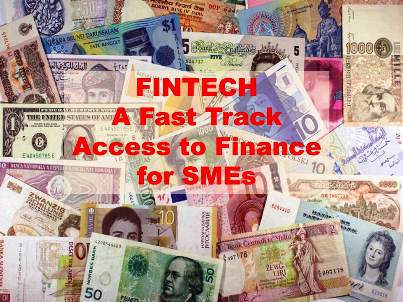 Small and medium sized enterprises (SMEs) are the backbone of every nation’s economy and the driving force behind job creation, yet many fail within just a few years. They face many obstacles including access to financing, competition from big business, cash flow, and government requirements – all of which may prevent them from growing into bigger businesses. CEB research discovered in 2013 that competition from big business grew to become the number one challenge facing small business, ahead of even cash flow and poor sales.[1] By 2015 the magnitude of the competition problem increased even further.[2] Unlike small businesses, big businesses possess the access to, and effectiveness in implementing, technology to give them a competitive edge.
Small and medium sized enterprises (SMEs) are the backbone of every nation’s economy and the driving force behind job creation, yet many fail within just a few years. They face many obstacles including access to financing, competition from big business, cash flow, and government requirements – all of which may prevent them from growing into bigger businesses. CEB research discovered in 2013 that competition from big business grew to become the number one challenge facing small business, ahead of even cash flow and poor sales.[1] By 2015 the magnitude of the competition problem increased even further.[2] Unlike small businesses, big businesses possess the access to, and effectiveness in implementing, technology to give them a competitive edge.
Enter, the FinTechs (“FinTech”, a portmanteau of “finance” and “technology”, is defined as technological innovation in the financial sector). Following the 2008 financial crisis, FinTech disruptors stepped in to provide alternative ways for SMEs to launch, run, and grow securely into the future. FinTech is seeing a rapid growth of startups entering the SME market as data, internet access, and customer acquisition becomes more available within increasingly supportive regulatory environments. These include peer-to-peer lending platforms, accounting, merchant and e-commerce finance platforms, invoice, supply chain finance and online trade finance platforms, and big data business analytics tools, to name a few.
The underserved potential of FinTech for small business is enormous. Governments, financial institutions, entrepreneurs, and investors alike can both support and benefit from this trend. Of the many FinTechs to respond to the challenges faced by SMEs, here are some of the best in the world.
- Payfirma – www.payfirma.com– Vancouver, Canada
Payfirma provides all the hardware and software needed to accept payments online, in store, in the field, or at the office. They also provide valuable payment reporting such as transaction history and sales reporting for companies that want to use their transactional data to inform better business decisions. Payfirma works primarily with medium-sized businesses making more than $50,000 in annual revenue and aspire to accept multiple forms of payment with ease. There are many payment processors around but Payfirma is focused on providing all encompassing payment solutions for on-the-ground businesses looking to startup and/or expand.
- SizeUp – www.sizeup.com– San Francisco, United States
SizeUp helps small businesses make smarter decisions through big data. It works with banks, financial technologies, and large companies to help them better serve their small business customers. Serving SME customers has historically been challenging for large enterprises. With SizeUp they are able to be a more authentic partner to help their SME customers grow through completely individualized market research using SizeUp’s big data, automation, and algorithms. Implementations include Wells Fargo, Deutsche Bank, Bloomberg BusinessWeek, U.S. Small Business Administration, and U.S. White House. Large enterprises who want to better serve and deepen their relationships with their SME customers will benefit from SizeUp.
- Bodetree – www.bodetree.com– Denver, United States
BodeTree integrates directly with its clients’ business financial information – from bank accounts to credit cards to their preferred accounting software – and shows SMEs a real-time view of their financial strengths and weaknesses. In under 5 minutes SMEs can access their business’s financial health, avoid pitfalls, and plan out a path to success that is aligned with its financial goals. Small businesses and startups that want to spend more time planning out their futures and less time crunching numbers could utilize Bodetree to easily uncover financial trends and chart a path to meaningful growth.
- BCSG – www.bcsg.com– London, United Kingdom
BCSG provides a range of digital solutions and cloud services in a centralised, digital hub specifically to help large organizations such as banks and telcos serve their small and medium-sized business customers. It’s one-stop shop of hand-picked FinTech apps facilitates a more meaningful customer relationship with your SMEs customers with end-to-end technical and commercial support. These include services from companies such as Sage, Constant Contact, SizeUp, Mozy, and Export Enterprises. BCSG’s FinTech hubs enable large organizations to deliver valuable, customized digital services to SME customers across multiple geographies and channels. It’s customers include Deutsche Bank, Mastercard, Santander, T-Mobile, AIB, Westpac, and MTN.
- LivePlan – www.liveplan.com– Eugene, United States
Starting a business is difficult, but LivePlan’s platform makes business planning, strategizing, budgeting, forecasting, and performance tracking much simpler. LivePlan breaks the business planning process down into simple steps with instructions and over 500 examples to learn from. Simply enter your goals and LivePlan automatically creates your financial statements. From initial feasibility analysis to growth and expansion, entrepreneurs, startups and small businesses interested in business planning, goal setting, and financial tracking could make good use of LivePlan.
- Entrepreneurial Finance Lab – www.eflglobal.com– Lima, Peru
Entrepreneurial Finance Lab (EFL) employs psychometric and nontraditional applicant data to create credit scores to measure risk and potential among new and existing small businesses. The SMEs of emerging and developing economies face critical problems in accessing finance due to lack of credit history. EFL’s new technology directly measures an entrepreneur’s risk and enables credit access to the previously “un-banked” SMEs. Their list of clients includes, but is not limited to, Grupo Monge (GMG), Banco G&T Continental (G&T), Edgars, Banco Pichincha. In short, their method of implementing psychometric credit scoring facilitates a deep quantitative understanding of individual risk and opportunity in small business and an alternative method to make better lending decisions.
- Kabbage – www.kabbage.com– Atlanta, United States
Kabbage’s loan platform operates much like a line of credit- borrowers agree to terms of 1 to 12 months and only pay interest on funds that they’ve withdrawn from their line, which is typically $2,000 to $100,000. Kabbage has quickly achieved celebrity among SMEs by offering loans at approximately half the cost of a traditional merchant cash advances. So, if you’re a SME with a need to attain working capital, have at least $50,000 in annual revenue, and a less than perfect credit rating, Kabbage may be the right fit for you.
- Kopo Kopo – http://kopokopo.com– Nairobi, Kenya
Kopo Kopo is a Square, Inc.-like platform that provides tools to facilitate mobile payments transactions between small and medium sized businesses and their customers. Their software piggybacks off the M-Pesa mobile payments structure and is connecting thousands of merchants to “unbanked” consumers via mobile payments. Kopo Kopo is currently working with over 12,500 merchants in East Africa and they are signing approximately 1,500 new merchants a month. So, if you’re interested in the future of mobile payments in developing regions, Kopo Kopo is a good place to start.
- Oxigen – www.myoxigen.com– Gurgaon, India
Oxigen is the first virtual wallet in India, to be integrated with NPCI (National Payments Corporation of India) that allows for instant money transfers anytime, anywhere using Immediate Payment Service (IMPS). Oxigen allows users to send and receive money using the mobile number as the chief identification which is instant, secure, reliable and can be used across multiple devices like web, mobile or SMS. Currently, Oxigen has over 130,000 outlets (there are 90,000 total bank branches in India) in India and processes over 30 million transactions between merchants and customers each month.
- Funding Societies – www.fundingsocieties.com– Singapore
Funding Society is currently Singapore’s top SME credit marketplace and is currently expanding to other Southeast Asian countries. Its online lending platform provides responsible SMEs access to adequate and equitable funding from individual lenders and institutional investors- filling the financing gap in Southeast Asia. Visit Funding Society if you’re a SME interested in growing your business or an investor looking to partner with SMEs in Southeast Asia.
-
CEB Research, July 2013, n=1087 N.A.; July 2011, n=1099 N.A.; July 2009, n=1228 N.A. The top 5 rankings are 1. Competition from big businesses, 2. Cash flow, 3. Poor sales, 4.Government requirements, 5. Quality of labor
-
“Why your marketing should change as the economy does,” CEB, November 5, 2015. https://www.cebglobal.com/blogs/marketing-to-small-business-why-your-marketing-should-change-as-the-economy-does/

About the Author: Joshua D Greeting is Assistant Planner at the County of Sacramento, California. His articel was published on LinkedIn.























